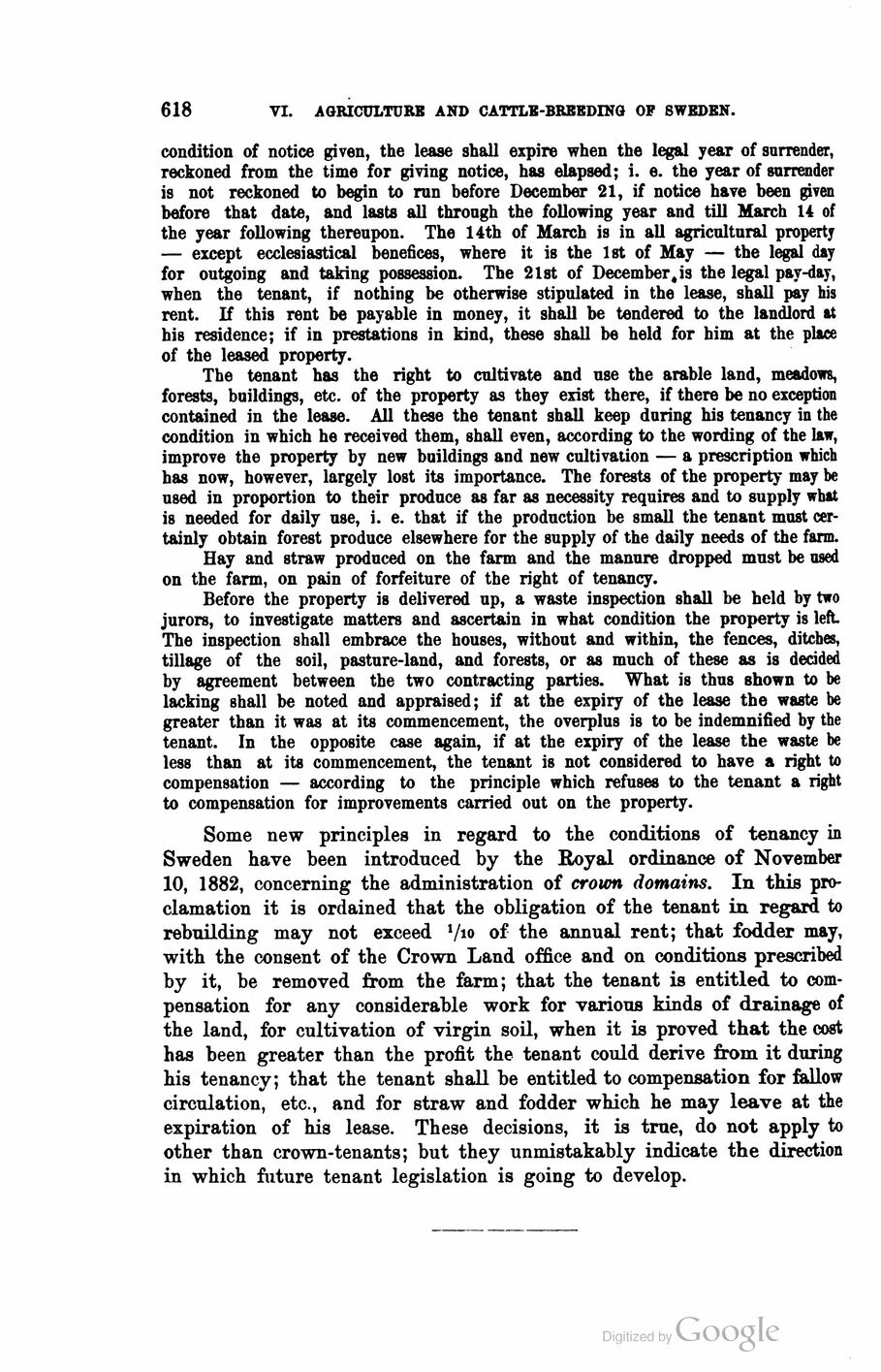
Full resolution (JPEG) - On this page / på denna sida - Second part - VI. Agriculture and Cattle-Breeding - 6. Agricultural Legislation. By Judge C. Th. af Ekenstam, Visby, Member of the Riksdag - Tenant Legislation

<< prev. page << föreg. sida << >> nästa sida >> next page >>
Below is the raw OCR text
from the above scanned image.
Do you see an error? Proofread the page now!
Här nedan syns maskintolkade texten från faksimilbilden ovan.
Ser du något fel? Korrekturläs sidan nu!
This page has never been proofread. / Denna sida har aldrig korrekturlästs.
618
VI. AGRICDLTURE AND CATTLE-BREEDING OF SWEDEN.
condition of notice given, the lease shall expire when the legal year of surrender,
reckoned from the time for giving notice, has elapsed; i. e. the year of surrender
is not reckoned to begin to run before December 21, if notice have been given
before that date, and lasts all through the following year and till March 14 of
the year following thereupon. The 14th of March is in all agricultural property
— except ecclesiastical benefices, where it is the 1st of May — the legal day
for outgoing and taking possession. The 21st of December, is the legal pay-day,
when the tenant, if nothing be otherwise stipulated in the lease, shall pay his
rent. If this rent be payable in money, it shall be tendered to the landlord at
his residence; if in prestations in kind, these shall be held for him at the place
of the leased property.
The tenant has the right to cultivate and use the arable land, meadows,
forests, buildings, etc. of the property as they exist there, if there be no exception
contained in the lease. All these the tenant shall keep during his tenancy in the
condition in which he received them, shall even, according to the wording of the law,
improve the property by new buildings and new cultivation — a prescription which
has now, however, largely lost its importance. The forests of the property may be
used in proportion to their produce as far as necessity requires and to supply what
is needed for daily use, i. e. that if the production be small the tenant must
certainly obtain forest produce elsewhere for the supply of the daily needs of the farm.
Hay and straw produced on the farm and the manure dropped must be used
on the farm, on pain of forfeiture of the right of tenancy.
Before the property is delivered up, a waste inspection shall be held by two
jurors, to investigate matters and ascertain in what condition the property is left
The inspection shall embrace the houses, without and within, the fences, ditches,
tillage of the soil, pasture-land, and forests, or as much of these as is decided
by agreement between the two contracting parties. What is thus shown to be
lacking shall be noted and appraised; if at the expiry of the lease the waste be
greater than it was at its commencement, the overplus is to be indemnified by the
tenant. In the opposite case again, if at the expiry of the lease the waste be
less than at its commencement, the tenant is not considered to have a right to
compensation — according to the principle which refuses to the tenant a right
to compensation for improvements carried out on the property.
Some new principles in regard to the conditions of tenancy in
Sweden have been introduced by the Royal ordinance of November
10, 1882, concerning the administration of crown domains. In this
proclamation it is ordained that the obligation of the tenant in regard to
rebuilding may not exceed i/io of the annual rent; that fodder may,
with the consent of the Crown Land office and on conditions prescribed
by it, be removed from the farm; that the tenant is entitled to
compensation for any considerable work for various kinds of drainage of
the land, for cultivation of virgin soil, when it is proved that the cost
has been greater than the profit the tenant could derive from it during
his tenancy; that the tenant shall be entitled to compensation for fallow
circulation, etc., and for straw and fodder which he may leave at the
expiration of his lease. These decisions, it is true, do not apply to
other than crown-tenants; but they unmistakably indicate the direction
in which future tenant legislation is going to develop.
<< prev. page << föreg. sida << >> nästa sida >> next page >>